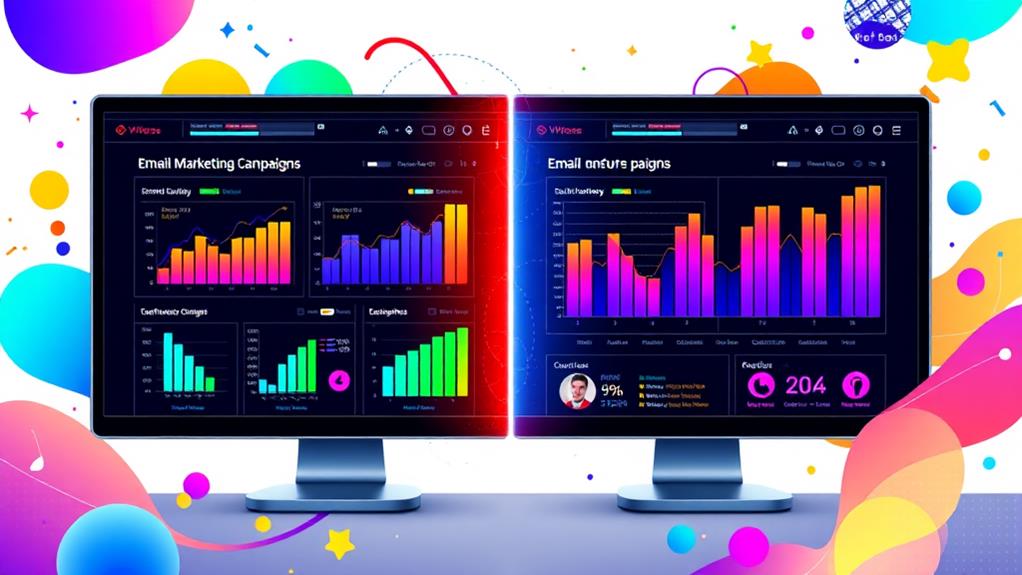In 2024, small businesses looking to harness the powerful ROI of email marketing should consider tools like Klaviyo, Mailchimp, and ActiveCampaign. Klaviyo excels with its sophisticated e-commerce analytics and segmentation. Mailchimp offers a user-friendly interface and a freemium model, while ActiveCampaign is known for its advanced automation and CRM integration. These platforms provide essential features like behavior-triggered messaging, A/B testing, and robust integration capabilities to enhance workflows and engagement. Free options like MailerLite enable cost-effective beginnings. To access the full potential of these platforms and tailor strategies for maximum impact, there is much more to explore.
Key Takeaways
- Klaviyo excels in e-commerce analytics and segmentation, making it ideal for small businesses seeking data-driven insights.
- Mailchimp offers a user-friendly interface and a freemium model, perfect for small businesses starting with email marketing.
- Sender provides affordability and high deliverability rates, ensuring cost-effective and reliable email campaigns.
- Brevo integrates email, SMS, and chat, supporting multi-channel communication strategies for small businesses.
- ActiveCampaign offers robust automation and CRM integration, enhancing advanced workflows and customer relationship management.
Importance of Email Marketing
Harnessing the power of email marketing is a strategic move for small businesses aiming to establish a direct and effective line of communication with their customers. With billions of emails sent daily, this platform serves as a cornerstone for building robust customer engagement. The impressive average return on investment (ROI) of $42 for every $1 spent underscores its cost-effectiveness as a marketing strategy, offering tangible benefits for businesses with limited budgets.
Email marketing is not only about reaching a wide audience but also about fostering customer retention through targeted campaigns. In 2022, 67% of email marketers reported increased open rates, a demonstration to the effectiveness of well-crafted emails that resonate with recipients.
The ability to segment audiences based on user intent further enhances this engagement, allowing businesses to tailor messages that align with specific interests and behaviors. This personalized approach is essential for developing effective retention strategies, as evidenced by low unsubscribe rates of 0.12% in Great Britain.
Ultimately, email marketing empowers small businesses to maintain meaningful dialogues with their customers, fostering loyalty and sustained engagement. By leveraging these strategic insights, small businesses can maximize their marketing efforts and achieve considerable growth.
Key Features to Consider
When selecting email marketing tools, small businesses should prioritize essential automation features that streamline campaign management and enhance subscriber engagement.
Automation capabilities such as scheduling and behavior-triggered messaging greatly improve operational efficiency and customer interaction.
Equally important are integration capabilities with other marketing platforms and CRM systems, which facilitate seamless data flow and thorough customer management, ultimately supporting cohesive marketing strategies.
Essential Automation Tools
In the domain of email marketing, automation represents a pivotal advancement that empowers small businesses to enhance their communication strategies with precision and efficiency. The automation benefits are manifold; they allow enterprises to schedule campaigns, nurture leads, and personalize content based on user behavior, greatly increasing engagement rates.
Workflow optimization is a key feature, enabling marketers to streamline their operations. Conditional workflows are particularly advantageous, as they trigger automated emails based on customer actions like cart abandonment or purchase confirmations, thereby enriching the customer experience.
Another critical component is advanced segmentation capabilities. These enable businesses to create automated campaigns that are tailored to specific audience groups, which results in more relevant and effective messaging. This strategic segmentation guarantees that communications are not only timely but also resonate with the target audience, enhancing engagement.
Additionally, A/B testing functionalities within automation tools offer a strategic edge by allowing marketers to optimize email performance. By automatically sending variants of emails, businesses can determine which versions generate higher conversion rates.
These data-driven insights enable small businesses to refine their strategies continuously, guaranteeing their email marketing efforts are both effective and efficient.
Integration Capabilities
Building on the advantages of automation tools, integration capabilities emerge as a vital aspect for small businesses aiming to enhance their email marketing strategies. These capabilities allow email marketing platforms to seamlessly connect with CRM systems, e-commerce platforms, and various marketing tools, greatly enhancing data flow and campaign efficiency.
Remarkably, integration benefits include the ability to automate workflows and synchronize subscriber lists across multiple platforms through tools like Zapier, ensuring that businesses can maintain up-to-date and accurate customer data.
Effective integration features further support advanced audience segmentation by syncing customer data, allowing for more targeted and personalized email campaigns. This synchronization not only improves engagement rates but also optimizes marketing efforts by delivering relevant content at the right time.
Additionally, robust API access is essential as it permits businesses to customize and extend platform functionality, ensuring compatibility with existing systems and processes.
However, integration challenges must be considered, such as potential data discrepancies and system incompatibilities, which can impact campaign effectiveness.
To mitigate these challenges, platforms offering extensive integration capabilities enhance reporting and analytics by consolidating data from various sources, providing a thorough view of campaign performance and customer interactions.
Top Email Marketing Platforms
Choosing the right email marketing platform can greatly impact the success of small businesses aiming to optimize their digital outreach. With the right tools, businesses can leverage email segmentation strategies and campaign performance metrics to enhance customer engagement and conversion rates. Klaviyo, for instance, stands out with its robust e-commerce features and analytics, making it an ideal choice for businesses that prioritize data-driven insights. Its ability to fine-tune email segmentation strategies helps deliver personalized experiences to target audiences.
Mailchimp remains a staple for small businesses, offering an intuitive interface and a freemium model that enables startups to launch their campaigns without upfront costs. Sender provides an attractive option due to its affordability and high deliverability rates, essential for ensuring messages reach intended recipients. Meanwhile, Brevo offers a holistic approach with its multi-channel capabilities, integrating email, SMS, and chat for cohesive communication strategies. ActiveCampaign excels in automation and CRM integration, offering sophisticated workflows for advanced email marketing.
| Platform | Key Features |
|---|---|
| Klaviyo | E-commerce analytics, segmentation strategies |
| Mailchimp | User-friendly, freemium model |
| Sender | Affordable, high deliverability |
| Brevo | Multi-channel, seamless communication |
| ActiveCampaign | Advanced automation, CRM integration |
Selecting the right platform aligns technology with strategic marketing objectives.
Strategies for Effective Campaigns
Crafting effective email marketing campaigns requires a strategic approach that combines data-driven insights with creative execution. One fundamental strategy is audience segmentation, which involves categorizing recipients based on factors like purchase history and geographical location. This tailored approach enhances campaign performance by delivering more relevant content, thereby boosting engagement rates.
In 2022, email marketers observed a notable 67% average open rate when using clear and engaging subject lines coupled with recognizable brand names.
To further enhance campaign performance, incorporating strong calls-to-action (CTAs) is essential. Effective CTAs greatly increase click-through rates, directing recipients towards desired actions and contributing to overall campaign success.
However, the strategy doesn't end with execution; ongoing analysis is imperative. Regularly reviewing metrics such as open rates and click-through rates, alongside A/B testing, provides invaluable insights to refine future strategies.
In addition, maintaining a clean email list is important for sustaining high deliverability rates. Removing undeliverable addresses and closely monitoring bounce rates guarantees the health of your list, ultimately strengthening your email campaigns.
Free Vs Paid Options
When evaluating email marketing tools, businesses often face the critical decision between free and paid options. Free features in tools like MailerLite and Sender typically cater to startups with limited budgets, offering basic capabilities and subscriber support—MailerLite allows up to 1,000 subscribers, while Sender extends this to 2,500 with a monthly cap of 15,000 emails.
However, these free features often come with constraints on sending limits, as seen with platforms like Mailchimp and Brevo, which can impede the scalability of campaigns.
In contrast, paid benefits provide an array of advanced functionalities pivotal for strategic growth:
- Automation: Streamlines workflows and personalizes customer journeys.
- Segmentation: Enables targeted messaging based on user behavior and preferences.
- Analytics: Supplies in-depth insights for performance tracking and optimization.
- ROI Maximization: Enhanced capabilities often result in better engagement and conversions.
With the average cost for robust email marketing software hovering around £15/month for 500 contacts, many businesses find paid options affordable and worthwhile.
The superior tools offered in paid plans can drive higher ROI by optimizing campaigns, making them more effective in engaging audiences and converting leads into loyal customers.
Integrating Email With Other Channels
Integrating email marketing with other communication channels is not just a trend but a strategic necessity for today's businesses seeking to maximize their outreach efforts. By leveraging cross channel synergy, companies can considerably enhance their engagement strategies.
For instance, integrating email marketing with social media platforms has proven to be highly effective, with 76% of marketers experiencing improved campaign performance through multi-channel outreach. Social media, when combined with email, allows for a broader reach and deeper engagement.
Moreover, the incorporation of SMS into email marketing strategies has shown a notable impact on engagement, with omnichannel approaches yielding up to a 20% increase in customer interaction rates. The seamless integration of email with CRM systems further boosts personalization, aligning communication with customer behavior and preferences. This tailored approach can result in a 14% rise in conversion rates.
Additionally, the combination of email with push notifications can drive immediate user actions, enhancing retention rates by 30%.
Enhancing ROI With AI and Automation
Harnessing the power of AI and automation in email marketing can substantially boost efficiency and ROI for small businesses.
AI-driven personalization delivers tailored content based on user behavior, resulting in emails that generate six times higher transaction rates.
Simultaneously, automation tools streamline workflows, enabling businesses to send timely messages and increase open rates by up to 50%, while predictive analytics optimizes strategies for a 10-20% lift in conversions.
Boosting Efficiency With Automation
Automation's transformative power in email marketing allows small businesses to streamline operations, reduce manual efforts, and enhance overall efficiency. By automating tasks such as workflow enhancement and campaign scheduling, businesses can focus on strategic growth rather than routine tasks.
Automation tools enable the scheduling of email campaigns, which guarantees timely delivery and maximizes audience engagement. This results in reduced manual workload and improved resource allocation, making it a valuable asset for small enterprises aiming to increase productivity.
The integration of automation in email marketing offers several strategic benefits:
- Automated Campaign Scheduling: Guarantees messages are sent at ideal times, increasing open and interaction rates.
- AI-Driven Analytics: Provides insights into user behavior, allowing for more precise audience segmentation and enhanced targeting.
- Automated Email Sequences: Such as welcome series and abandoned cart reminders, improve customer experiences and drive conversion rates.
- A/B Testing Capabilities: Facilitates the enhancement of subject lines and content, leading to higher engagement.
With these tools, businesses can achieve an impressive ROI, exemplified by the $40 return for every dollar spent on email marketing.
Personalizing Emails Using AI
Leveraging the power of AI in email marketing, small businesses can markedly enhance personalization to drive engagement and optimize returns. AI-driven personalization enables the crafting of emails that resonate on a deeper level with recipients, leading to increased click-through rates by up to 14% and conversion rates by 10%. This strategic approach is grounded in the ability of AI to analyze and utilize data effectively, allowing businesses to achieve higher engagement with minimal effort.
AI's capability for behavioral segmentation is a game-changer, allowing for precise audience targeting based on user behavior, interests, and demographics. By segmenting audiences in this way, businesses can deliver more relevant and timely messages, thereby strengthening customer loyalty and increasing the likelihood of conversion.
Additionally, AI algorithms can predict future behaviors by analyzing past interactions, providing valuable insights for crafting content that meets subscribers' needs.
Integrating AI with email marketing platforms further enhances personalization through dynamic content creation. This allows emails to adapt in real-time to user preferences, fostering greater engagement and retention.
Ultimately, implementing AI-driven personalization in email marketing can yield a substantial return on investment, with an average of $42 earned for every $1 spent.
Frequently Asked Questions
What Is the Best Email Marketing Platform in 2024?
In 2024, Klaviyo emerges as the leading email marketing platform, excelling with sophisticated email design and advanced automation features. Its strategic advantage lies in delivering data-driven insights, making it particularly effective for e-commerce businesses seeking growth.
Is Email Marketing Still Relevant in 2024?
Email marketing remains highly relevant in 2024, with significant email engagement driven by audience segmentation. Its strategic integration into marketing campaigns enhances customer relationships, evidenced by increased open rates and substantial ROI, underscoring its continued effectiveness and value.
What Is the Next Big Thing in Email Marketing?
The next big thing in email marketing involves leveraging personalization trends and automation innovations. These advancements enable brands to deliver highly tailored content, optimize engagement rates, and strategically integrate cross-channel experiences while maintaining compliance with evolving data privacy regulations.
What Is the Best Email Platform for a Small Business?
The ideal email platform for small businesses integrates customer segmentation strategies and email automation benefits. Tailoring campaigns using these features enhances engagement, drives targeted outreach, and maximizes efficiency, fostering significant growth and improved customer relationships.
Conclusion
In 2024, selecting the ideal email marketing tools for small businesses necessitates a strategic evaluation of key features, integration capabilities, and cost considerations. Data-driven decisions regarding platform choice and campaign strategies can greatly enhance marketing effectiveness. Leveraging AI and automation plays a pivotal role in maximizing return on investment by facilitating personalized and efficient communication. A thorough approach that integrates email marketing with other channels is essential for achieving sustained engagement and business growth.




